Joe’s car broke down for the third time. He was late to work as a result, so he lost yet another job. To add to the insult, the power company turned off his electricity. You know this because he’s posting online asking for help.
Again.
And his teen daughter is a skank who can’t keep her legs together. Everyone in the church knows how that will end.
Ox-sized Joe shows up in church wearing the most hideous clothes that look slept in. You wonder if he passed out on the couch. You wonder what may have lubricated that slide into unconsciousness.
Still, Joe occupies the same pew week after week, skanky daughter in tow. Part of you feels for the guy. His wife died of cancer at 30, and Joe never was much in the parenting skills department. Look what he has to work with too.
But week after week, Joe’s in crisis. He’s an embarrassment when you get right down to it. The neediness never ends.
Really, the man should learn some boundaries. What’s next? Whatever the issue, it will probably arrive in five, four, three…
Every church has a guy like Joe. Or three or ten. Bad luck seems to shadow those folks. Their laments come one after another, and your compassion tank has run dry. Just bringing up their names elicits squirms and eye rolls. Isn’t it the responsibility of the mature to force folks like that to stand on their own two feet? Isn’t it high time for the tough love?
Paul wrote this:
The eye cannot say to the hand, “I have no need of you,” nor again the head to the feet, “I have no need of you.” On the contrary, the parts of the body that seem to be weaker are indispensable, and on those parts of the body that we think less honorable we bestow the greater honor, and our unpresentable parts are treated with greater modesty, which our more presentable parts do not require. But God has so composed the body, giving greater honor to the part that lacked it, that there may be no division in the body, but that the members may have the same care for one another. If one member suffers, all suffer together; if one member is honored, all rejoice together.
—1 Corinthians 12:21-26 ESV
 When we start talking about the weak, we rarely think of folks like Joe. Our thoughts go to the boy with cerebral palsy or the granny in the wheelchair, especially if that boy and granny don’t demand too much from us. As long as we don’t have to bail them out of endless predicaments, we can deal with their kind of weakness.
When we start talking about the weak, we rarely think of folks like Joe. Our thoughts go to the boy with cerebral palsy or the granny in the wheelchair, especially if that boy and granny don’t demand too much from us. As long as we don’t have to bail them out of endless predicaments, we can deal with their kind of weakness.
Fact is, that boy or granny may be stronger than Joe. Our opinion of problem people like Joe and his daughter and our thoughts they might be served better at another church may signal they are the weakest of all.
Every church has problem people we would rather avoid. If we were serious about what we believe, though, I think we must ask ourselves if it may be the “problem people” Paul intends for us to honor. Not the folks who would make good poster fodder for charities, but the ones who wouldn’t. The people who aggravate us. The ones who don’t know about “boundaries.” The ones we hope would go elsewhere for their spiritual food.
Do we have that wrong kind of hope for the weak? Do we hope the problem people would vamoose? Do we like to define who we think the weak are rather than letting God define them for us? Does God truly love the luckless Joes of this world and their skanky daughters?
Or does God only look proudly on the respectable people like us, the ones who can handle our own affairs without any help (thank you very much)? The ones who live as if we don’t need Him for anything.
You and I don’t get a say as to whom God declares weaker. Ours is but to do His will and make certain we honor those weaker people we sometimes wrongly hope would go away.

 If we’re increasingly a nation of people on psychoactive medication, should we be surprised? Isn’t there enough pain within ten miles of our homes to last us a lifetime? What then do we do when we hear an orphanage was buried under a mudslide in Ecuador or a bus full of nuns holding babies in their arms went off a cliff in Singapore?
If we’re increasingly a nation of people on psychoactive medication, should we be surprised? Isn’t there enough pain within ten miles of our homes to last us a lifetime? What then do we do when we hear an orphanage was buried under a mudslide in Ecuador or a bus full of nuns holding babies in their arms went off a cliff in Singapore?